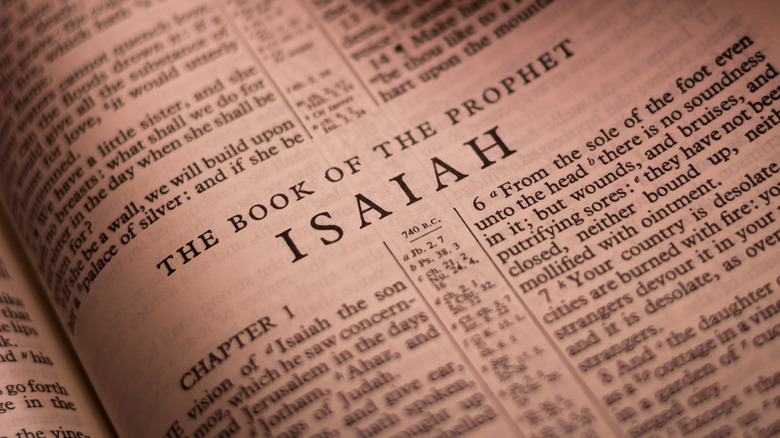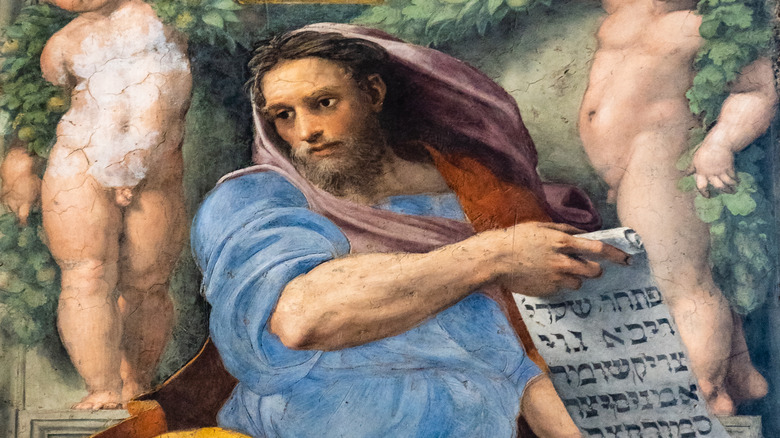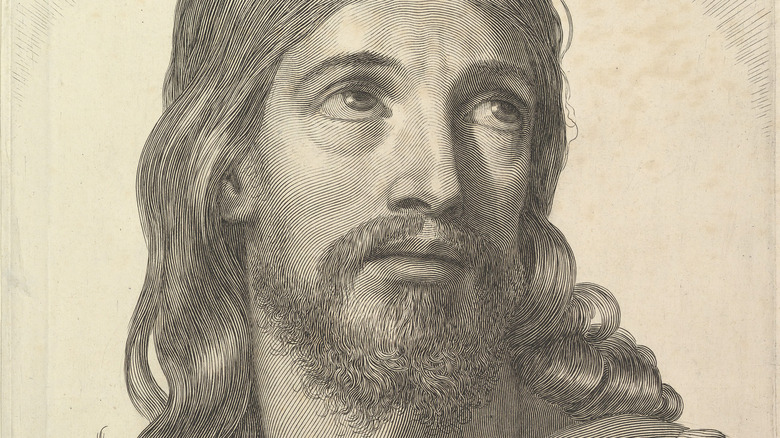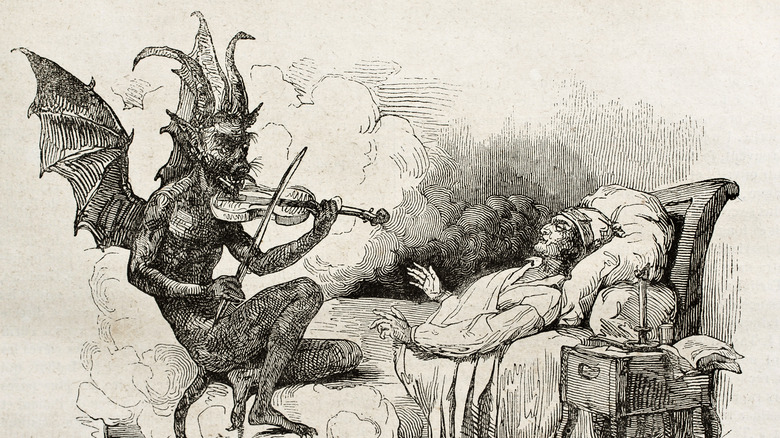The Untold Truth Of Isaiah From The Bible
Without the Hebrew prophet Isaiah, Jewish and Christian beliefs could look very different. Responsible for several key tenets of modern faith, Isaiah was born in Jerusalem, some 700 years before the birth of Christ. The biblical Book of Isaiah bears his name, although it is generally believed he only wrote the first 39 chapters of the story, with other writers completing the rest. Nonetheless, he was so influential, several of Isaiah's prophecies are recognizable to those who do not follow the Bible's teachings, per Biography.
Few prophets were as instrumental as Isaiah in describing the full width and breadth of what the Jewish and Christian faiths were, and what they would become in the modern world. His life story also offers fascinating insight into how God was interpreted in his time, and what the life of Jesus Christ could come to mean, both in antiquity and in the modern era.
Isaiah was perhaps royalty
Per Britannica, Isaiah lived in the eighth century B.C. It's thought that Isaiah had several audiences with kings and royalty of his time. For this reason, it's likely that Isaiah's family was also royalty, or at the very least, members of the aristocracy, although no one knows for sure. If true, Isaiah remained interested in the plight of the poor throughout his life, frequently speaking out against the excesses of the rich.
Since little is known about Isaiah's father, Amoz, not to be confused with the Prophet Amos, it is thought by some that Isaiah's family may have also been clerical. Supporting this theory are several instances in which Isaiah demonstrated intimate knowledge of the inner workings of the church, and that his commissioning — or the act of becoming a disciple — happened in the Temple at Jerusalem. Isaiah was certainly well-educated, and may have come from a long line of prophets, with his teachings and legacy bridging many life experiences.
Isaiah seemingly predicted the modern state of Israel
Perhaps most notable among Isaiah's prophecies is something similar to the modern state of Israel, or that after many years (in this case, centuries) of suffering and turmoil, Jews from all around the world would recover from their "blindness" and gather once more in their homeland, per Crosswalk. Once restored, the area that would one day become Israel would "take root ... blossom and put forth shoots and fill the whole world with fruit" (per Isaiah 27:6).
As History records, Isaiah's prophecy possibly came to pass some 2,000 years later, in 1948, when the state of Israel was declared, although continuing conflict between the Jewish state and the Arab world, with some culpability on both sides of the issue, threatens stability in the region. Relating to Isaiah's prophecy and the modern state of Israel, his teachings also perpetuate the notion of an enduring "covenant" between God and the Jewish people, which was a great comfort to the Israelites in a time of great suffering.
Did Isaiah foretell the coming of Jesus?
Central to the Christian faith are, of course, the teachings of Jesus Christ. Although Isaiah lived long before the real Jesus walked the earth, he did foretell the coming of a savior in several of his prophecies, per Crosswalk.
Some possibilities of Isaiah foretelling the story of Christ long before it ever happened can be found in a couple of passages. "Therefore the Lord himself shall give you a sign; Behold, a virgin shall conceive, and bear a son, and shall call his name Immanuel" (per Isaiah 7:14) and "For unto us a child is born, unto us a son is given: and the government shall be upon his shoulder: and his name shall be called Wonderful, Counselor, The mighty God, The everlasting Father, The Prince of Peace" (via Isaiah 9:6).
With these words, did Isaiah truly have a vision of the future, or instead, could Jesus have been aware of Isaiah's prophecy, modeling himself after those words said long before he was alive? The answer to that question remains a matter of faith.
He knew the reason Satan would fall
Also core to the Bible is the story of Satan's fall from grace, although in the time of Isaiah, the word "Satan" had many different meanings beyond what it's come to mean today, including "accuser" and "adversary." Per Women Living Well, Lucifer, in Latin, means light bringing, and for this reason Lucifer, or Satan, is referred to as the Day Star, or the Morning Star, in the Book of Isaiah, as well as in the Book of Ezekiel.
This information relates to how Isaiah describes Satan beginning as an angel, or as God's beautiful cherub before pride led him to covet God's position, meaning Satan did not so much fall from grace but was instead cast out by God for this transgression, per Crosswalk. Whether referring to an actual Satan or some other kind of metaphor, one key takeaway from Isaiah is the notion that pride can indeed lead to downfall, a relevant lesson even today.
For Isaiah, God was both judgmental and merciful
In many ways, the way we view God today was influenced by the writings of Isaiah. In Isaiah's writings, God became holy, such as in Isaiah 6:3, which says, "Holy, holy, holy is the Lord of hosts; the whole earth is full of his glory!" But the notion of God also became judgmental in the time of Isaiah, or that a "consuming fire" would come to punish rebellion, idolatry, and pride, among other sins (via Crosswalk). For Isaiah, though, God was also merciful, gracious, and compassionate, such as in Isaiah 30:18, which says, "Yet the Lord longs to be gracious to you; therefore he will rise up to show you compassion."
Those words, among many truths about the life and teachings of Isaiah, provide great comfort, both to the people of Isaiah's time and for those alive today. From religious doctrine to biblical history, learning the true story of Isaiah from the Bible certainly presents a fascinating and nuanced view of humanity, of times long ago, and many things that continue to motivate our actions, even today.





